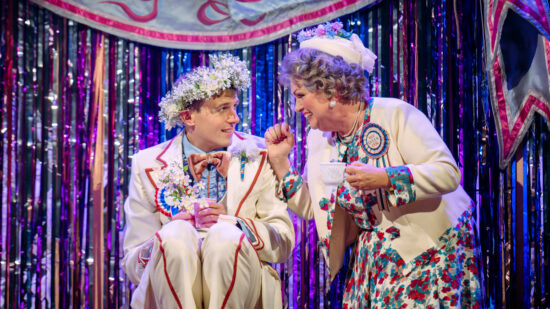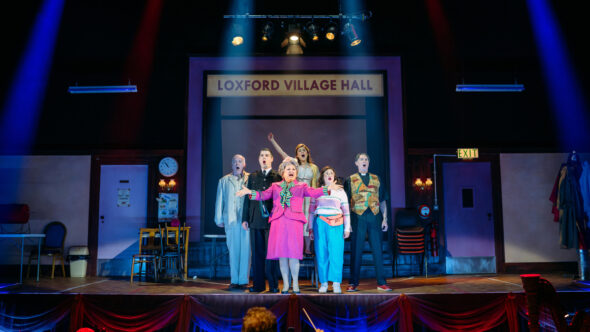 United Kingdom Britten, Albert Herring: Soloists, Orchestra of Scottish Opera / William Cole (conductor). Theatre Royal Glasgow, 22.10.2024. (GT)
United Kingdom Britten, Albert Herring: Soloists, Orchestra of Scottish Opera / William Cole (conductor). Theatre Royal Glasgow, 22.10.2024. (GT)

Production:
Director – Daisy Evans
Assistant Director – Mark Burns
Stage designer – Kat Heath
Lightning designer – Jake Wiltshire
Cast:
Albert Herring – Glen Cunningham
Lady Billows – Susan Bullock
Florence Pike – Jane Monari
Miss Wordsworth – Kira Kaplan
Mr Gedge – Francis Church
Mr Upfold – Jamie MacDougall
PC Budd – Edward Jowle
Sid – Ross Cumming
Nancy – Chloe Harris
Mrs Herring – Christine Sjölander
Emmie – Sarah Power
Cis – Audrey Tsang
Harry – Cliona Cassidy
This new production was given its premiere at the Lammermuir Festival on 5 September this year at the Haddington Corn Exchange to great success, and here at the more spacious Theatre Royal Glasgow, more opportunity was allowed to present this intimate comedy of 1947. In contrast to the tragedy of Peter Grimes, Britten revealed his genius in this village satire on societal morality and the maturing of the main character of Albert Herring, the son of a humble greengrocer. The libretto by Eric Crozier was based on Maupassant’s Le Rosier de Madame Husson and transfers the action to a locality close to Britten’s home county of Suffolk. The opera has been widely acclaimed far beyond East Anglia in many successful productions; interestingly, the pianist Sviatoslav Richter avowed it the finest comic opera of the twentieth century and produced it himself in Moscow in 1983.
The opera was first heard in Scotland in August 1965 at the Edinburgh Festival in a performance by the English Opera Group at the King’s Theatre. Scottish Opera’s first production was in 1966 in the more intimate setting of the Perth Theatre under the direction of Roderick Brydon and stayed in the repertoire until 1971. It was taken to Florence on tour in 1968 paving the way for several of Britten’s chamber operas by the company. Among the singers were Johanna Peters as Florence and Bill McCue as PC Budd, after which Albert Herring has been performed at the RSAMD (RCS) and by Byre Opera at St Andrews University in 2014.

The stage setting through the three acts was the Loxford Village Hall with two doors on either side of the entrance that alternated as a stage in Act II. This unpretentious setting allowed Daisy Evans’s staging to bring out the acting and singing with greater clarity. The costumes and staging could be placed in either 1900, or the post-war period, and with the lustrous curtains on the stage, even in modern times.
Underlying in the narrative are the issues of identity and the discovery of a young man’s role in society – issues which beset the composer in many operas – it is the composer’s personality that we witness unravelling before our eyes. Most certainly Crozier’s satirical picture of the British Empire in the immediate post-war time when Britain’s role in the world was rapidly changing is evidenced in the class issues of English village life – in Britten’s case, East Anglia in 1947. In the composer’s paring of the orchestra to a bare minimum, the wealth of musical ideas and the depiction of the central characters were superbly elucidated. With the reduced orchestration, Britten gives emphasis to his characters and their relationships.
Of the central characters, the Lady Billows of Susan Bullock evinced all the petty bullying characteristics of her elderly aristocratic part; sometimes pompous or arrogant, Bullock is magnificent, perhaps reprising some of her Wagnerian roles. While the part of schoolteacher Miss Wordsworth is taken by the American soprano Kira Kaplan and she proved an excellent comic actor as she told of the sexual misdeeds of the candidates for the Queen of the Festival, thus opening up the opportunity for the greengrocer’s son to be the surprise choice. Kaplan’s singing and characterisation was masterful and among the highlights of the evening. Most of all, the title part was excellently portrayed by the young Scottish tenor Glen Cunningham, with a striking voice and playing the shy, adolescent through to the confident young man at the close. Cunningham showed he has a great future and already revealed his potential as Flute in Scottish Opera’s A Midsummer Night’s Dream in 2022. The Florence Pike of the American mezzo-soprano Jane Monari was another outstanding voice and her housekeeper made a dynamic contribution to the intricate plot.
Of the secondary roles, the bass-baritone of PC Budd, taken masterfully by Edward Jowle, was constantly lively, either playing an oversexed man or a lazy village policeman, as was Mayor Upfold superbly portrayed by Jamie MacDougall. One of the highlights was the accompaniment by solos from Eilidh Gillespie’s flute to Lady Billows’s ‘May Queen’ monologue, or PC Budd being associated with a colourful sequence from Graeme Brown’s bassoon adding to the rib-tickling singing of Jowle’s vocals and acting. Albert Herring’s inebriate hangover in Act III was enhanced delightfully by the clarinet of Kate McDermott and the bassoon of Brown. The vividly witty contributions by the percussion and piano added to the fun of the show throughout.
The choreography was quickly moving, and the scenes of the feast were well enacted without making it overly excessive, keeping the witty drama at its core. In all, this was an excellent production bringing out the bitter satirical narrative of Britten’s opera. It was distinguished by outstanding singing and virtuosic orchestral playing held together masterfully by the conducting of William Cole in his debut at Scottish Opera.
This opening to the 2024-25 season augers well for Scottish Opera who launch new productions of The Makropulos Affair, The Merry Widow and a double bill of Gilbert and Sullivan in A Matter of Misconduct and A Trial by Jury next year, and a revival of Don Pasquale. This excellent production tours to the Edinburgh Festival Theatre on 13 November.
Gregor Tassie